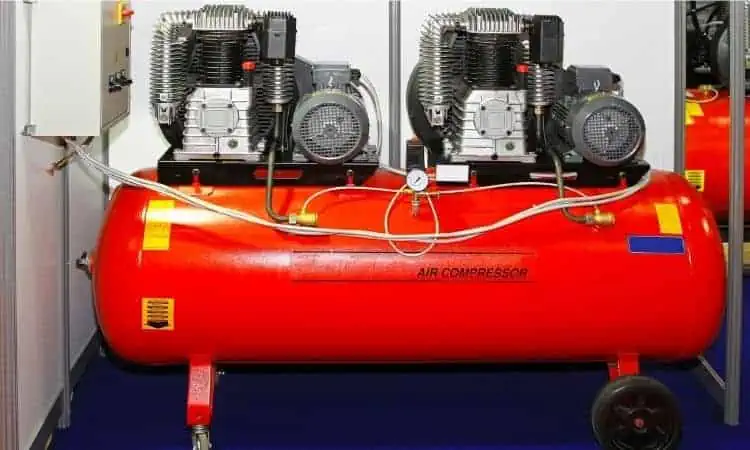There are many seemingly technical measurements and terms that can be confusing when dealing with an air compressor. If you’re not familiar with the terms used, it can be hard to know what compressor is best for you. Or, if you already have a compressor, it can be difficult to know which air tools you can and can’t use with your particular compressor. That’s why this article will explain air compressor measurements so you can make informed decisions when it comes to your air compressor.
Table of Contents
- Air Compressor Measurements at a Glance
- Air Compressor PSI
- CFM & SCFM
- Air Compressor HP
- Tank Size (In Gallons)
- Decibel Rating
- Duty Cycle
- In Conclusion
- Air Compressor Measurements FAQ’s
Air Compressor Measurements at a Glance
There are several air compressor measurements and terms that you’ll need to be familiar with to best use a compressor. These include:
- PSI – Pounds per Square Inch
- CFM – Cubic Feet per Minute
- SCFM – Standard Cubic Feet per Minute
- HP – Horsepower
- Tank Size in Gallons – Why Does Tank Size Matter?
- Decibel Rating – How Loud is the Compressor?
- Duty Cycle – How Long to Fill the Tank/Deliver Air?
We’ll take a look at these in turn. By the end of the article, you’ll have a full understanding of why all these air compressor factors are important.
Air Compressor PSI
PSI stands for Pounds per Square Inch. This is a measure of how much force a compressor is able to generate per square inch of space. A compressor operating at 90 PSI is able to deliver 90 pounds of pressure per square inch, which is important for operating air tools.
A PSI too low for a given air tool and the tool won’t operate properly. A PSI too high for the tool could damage it.
How Much PSI Do You Need?
Determining the PSI rating you need depends on what kind of air tools you’ll be using. Most compressors for home-use or non-industrial applications provide a max rating of 150 to 175 PSI, and can easily handle air tools with a required minimum pressure of 90 to 100 PSI.
Air tools state clearly the minimum PSI, so it’s not hard to figure this out.
The thing to keep in mind about PSI is you want to make sure your compressor is rated for a higher PSI than you need.
But PSI isn’t the only consideration. You also need to know about CFM, because both CFM and PSI are important in determining what compressor is right for you.
CFM & SCFM
CFM stands for cubic feet per minute. While PSI is a measure of pressure, CFM is a measure of flow. Another way to think of this is in terms of the compressor’s output ability. How many cubic feet per minute can the compressor provide, and at what pressure (PSI). A compressor that’s rated for 3.0 CFM @ 90 PSI provides 3 cubic feet per minute at 90 pounds per square inch.
SCFM is Standard Cubic Feet per Minute, and is a way of determining a more exact measurement of flow that a compressor is capable of.
What is the Difference Between CFM and SCFM?
Since things like atmospheric pressure, humidity, and ambient temperature can all affect a compressor’s flow, SCFM is measured using standard or ideal conditions, which are:
- 14.7 psia, 68 degrees Fahrenheit, and 36 percent humidity.
So SCFM is the flow rate of the compressor under certain ideal pressure and temperature conditions, whereas CFM is the actual flow rate of the compressor.
Since you likely won’t be operating your compressor under these ideal conditions all the time, the actual CFM will vary from the SCFM. Which is another reason why you’ll want to get a compressor that’s capable slightly more than what you’ll need it for.
How Much CFM Do You Need?
Like PSI, how much CFM you’ll need is determined by what you’ll be using the compressor for and the air tools you’ll be using. It’s easy to figure this out, as all air tools state clearly both the required CFM and PSI.
You’ll want to take a look at the air tools you’ll be using — specifically the one with the highest CFM and PSI — and get a compressor that’s capable of more than that.
Air Compressor HP
Chances are you’re familiar with the term horsepower. This is what HP stands for, and it’s a measure of how much power the compressor’s motor can provide. One horsepower is generally equivalent to 550 foot-pounds per second.
How Many HP Do You Need?
You really shouldn’t worry much about the horsepower of a compressor’s motor. This factor is much less important than PSI and CFM. Looking solely at HP is not a good indication of what the compressor can do, as some newer compressors are capable of more with less HP.
Although, if you’re looking to save money on energy costs, you could benefit from a lower HP compressor, as they tend to use less energy than compressors with higher HP motors.
It’s also important to note that electrical compressors that operate on a standard wall outlet will generally have motors rated at 2 HP or less. Larger motors than this require more voltage than a standard outlet can provide.
So, if you’re choosing a compressor, make sure your CFM and PSI needs are met, and then you can consider HP.
Tank Size (In Gallons)

You’ll also see that one of the major factors on air compressors is the size of the tank. Most compressors for home use have tanks ranging in size from 1 gallon to 10 gallons. For most people, a tank size somewhere in the middle works well — usually in the 6 to 8 gallon range.
What Tank Size Do You Need?
Measured in gallons, tank size is important when it comes to the type of work you’ll be doing with the compressor. For applications where a continuous flow of air is needed, a larger tank size will be more beneficial. For those applications where there air is used in short bursts, a smaller tank will do.
If the tank is too small, you’ll find that you need to stop your work and wait for the compressor to recharge before you can work again. A larger tank will prevent work interruptions. Again, this isn’t a big issue if you’re not using the air continuously.
Decibel Rating
You’ll also see compressors with a decibel rating. Decibels are used to measure noise levels. And if you’ve ever worked around a compressor before, you probably know how loud they can be.
Many people find that they want the lowest decibel rating they can get on their air compressor in order to save their eardrums while they work. They also want to ensure that they aren’t making enemies of their neighbors (or even their family members) by running a loud compressor all the time.
(P.S. If you’re looking to make your current compressor quieter, check out this article!)
What Decibel Rating is Best?
When talking about air compressors, a decibel rating under 80 is pretty good. As an example, a nearby garbage truck will be around 100 dB, whereas a normal conversation will be around 55 dB.
There are many companies that boast quiet compressors with decibel ratings between 60 and 70. If a quiet compressor is important to you, it’s certainly possible to find one for home use that won’t damage your hearing. However, if you’re looking at a larger compressor for continued use, you’ll probably have to put up with some high decibels.
Duty Cycle
A duty cycle is a term meant to describe how long it takes a compressor to run compared to the total time it takes to complete an entire cycle of running and resting. For example, a 25% duty cycle means that that compressor should run for a quarter of its total cycle time. So if the total cycle time was four minutes, the compressor would run (compressing air) for one of those four minutes. For the other three, it would be resting.
Why Is a Duty Cycle Important?
A compressor’s duty cycle is important because it tells you how much your compressor should be running and how much it should be resting. If you overwork your compressor and make it run for longer than is ideal, you’ll wear down the parts faster and it won’t last you as long.
While this isn’t often a big concern for those who need a compressor for casual home use, it is something to consider if you plan to use your compressor a lot and with continuous-use air tools.
In Conclusion
When taken in combination, the air compressor measurements explained in this article are important for getting the proper compressor and for ensuring its proper operation. Some factors are more important than others, such as PSI and CFM over HP and decibel rating. However, they all deserve some consideration before you decide on a compressor.
I hope that this article has helped you understand these definitions and factors so you can better choose and operate your air compressor!
Air Compressor Measurements FAQ’s
What is CFM and why is it important when selecting an air compressor?
CFM stands for cubic feet per minute and is a measurement of the amount of air a compressor can deliver. It is important when selecting an air compressor because it determines the speed and power of the compressor and whether it can meet your specific needs.
How is PSI measured in an air compressor?
PSI, or pounds per square inch, is the standard unit of measurement for air pressure in an air compressor. It is measured using a pressure gauge attached to the compressor.
What is the difference between gauge pressure and absolute pressure in air compressor measurements?
Gauge pressure measures the pressure above atmospheric pressure, while absolute pressure measures the pressure relative to a perfect vacuum. In air compressor measurements, gauge pressure is used as the standard measurement.
How do I convert CFM to SCFM?
CFM, or cubic feet per minute, can be converted to SCFM, or standard cubic feet per minute, by adjusting for temperature and pressure.
The formula for converting CFM to SCFM is: SCFM = CFM x (P1/P2) x (T2/T1), where P1 is the atmospheric pressure, P2 is the pressure at the compressor outlet, T1 is the temperature at the compressor inlet, and T2 is the temperature at the compressor outlet.
What is the maximum pressure rating for an air compressor?
The maximum pressure rating for an air compressor varies depending on the model and manufacturer, but is typically around 125-150 PSI for portable compressors and up to 200 PSI for larger stationary compressors. It is important to select an air compressor with a maximum pressure rating that is appropriate for your specific needs.


